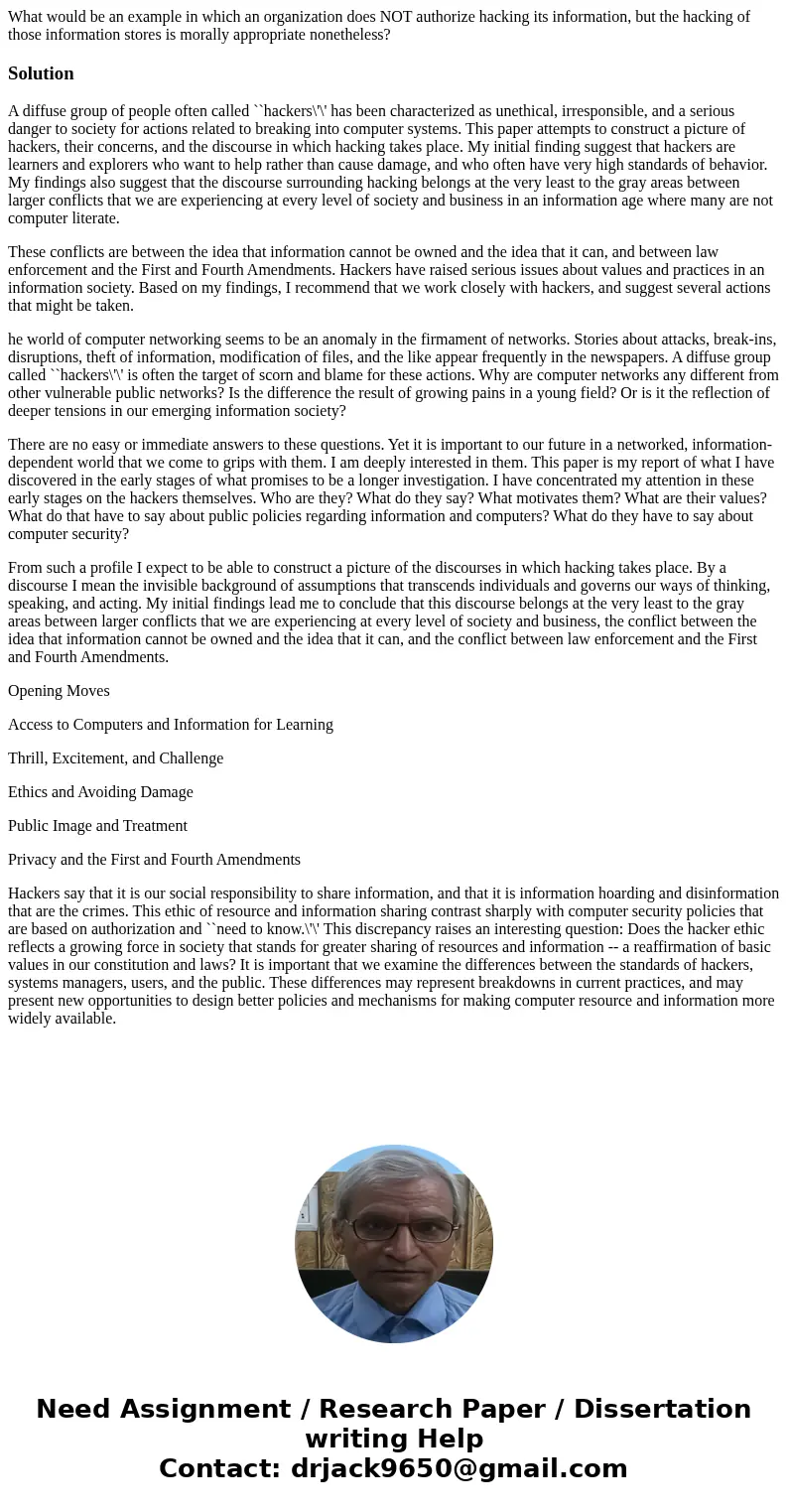What would be an example in which an organization does NOT a
What would be an example in which an organization does NOT authorize hacking its information, but the hacking of those information stores is morally appropriate nonetheless?
Solution
A diffuse group of people often called ``hackers\'\' has been characterized as unethical, irresponsible, and a serious danger to society for actions related to breaking into computer systems. This paper attempts to construct a picture of hackers, their concerns, and the discourse in which hacking takes place. My initial finding suggest that hackers are learners and explorers who want to help rather than cause damage, and who often have very high standards of behavior. My findings also suggest that the discourse surrounding hacking belongs at the very least to the gray areas between larger conflicts that we are experiencing at every level of society and business in an information age where many are not computer literate.
These conflicts are between the idea that information cannot be owned and the idea that it can, and between law enforcement and the First and Fourth Amendments. Hackers have raised serious issues about values and practices in an information society. Based on my findings, I recommend that we work closely with hackers, and suggest several actions that might be taken.
he world of computer networking seems to be an anomaly in the firmament of networks. Stories about attacks, break-ins, disruptions, theft of information, modification of files, and the like appear frequently in the newspapers. A diffuse group called ``hackers\'\' is often the target of scorn and blame for these actions. Why are computer networks any different from other vulnerable public networks? Is the difference the result of growing pains in a young field? Or is it the reflection of deeper tensions in our emerging information society?
There are no easy or immediate answers to these questions. Yet it is important to our future in a networked, information-dependent world that we come to grips with them. I am deeply interested in them. This paper is my report of what I have discovered in the early stages of what promises to be a longer investigation. I have concentrated my attention in these early stages on the hackers themselves. Who are they? What do they say? What motivates them? What are their values? What do that have to say about public policies regarding information and computers? What do they have to say about computer security?
From such a profile I expect to be able to construct a picture of the discourses in which hacking takes place. By a discourse I mean the invisible background of assumptions that transcends individuals and governs our ways of thinking, speaking, and acting. My initial findings lead me to conclude that this discourse belongs at the very least to the gray areas between larger conflicts that we are experiencing at every level of society and business, the conflict between the idea that information cannot be owned and the idea that it can, and the conflict between law enforcement and the First and Fourth Amendments.
Opening Moves
Access to Computers and Information for Learning
Thrill, Excitement, and Challenge
Ethics and Avoiding Damage
Public Image and Treatment
Privacy and the First and Fourth Amendments
Hackers say that it is our social responsibility to share information, and that it is information hoarding and disinformation that are the crimes. This ethic of resource and information sharing contrast sharply with computer security policies that are based on authorization and ``need to know.\'\' This discrepancy raises an interesting question: Does the hacker ethic reflects a growing force in society that stands for greater sharing of resources and information -- a reaffirmation of basic values in our constitution and laws? It is important that we examine the differences between the standards of hackers, systems managers, users, and the public. These differences may represent breakdowns in current practices, and may present new opportunities to design better policies and mechanisms for making computer resource and information more widely available.

 Homework Sourse
Homework Sourse